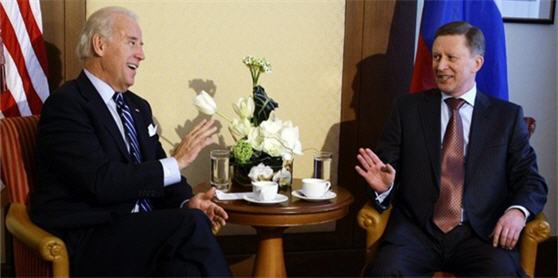
In 2010, one New Year’s resolution for the Obama administration would be to retire the entire “Russia reset” meme. From its ill-omened launch with the presentation of a button by Secretary of State Hillary Clinton to Foreign Minister Sergei Lavrov – inscribed in Latin (not Cyrillic) letters with a Russian word that implies a party is being shortchanged – the “reset” has labored under an apparent curse.
Initially envisioned by the Obama team as a way to show how they could handle the U.S.-Russia relationship in a more productive fashion than their Bush administration predecessors, the “reset” did not produce the expected results in 2009.
Getting the relationship off to a new and improved start wasn’t helped by comments made by Vice President Joe Biden that suggested Russia’s inevitable decline will lead it to become far more accommodating of U.S. policies. The vice president’s analysis might be on target for the long run, but to a Kremlin that feels it has survived the worst of the 2008 global financial crisis, it wasn’t an auspicious basis for assuming that the new administration was prepared to take Russian geopolitical concerns seriously. President Barack Obama’s attempts, ill-advised in my opinion, to try and affect the balance of power in the duumvirate between President Dimitry Medvedev and Prime Minister Vladimir Putin by suggesting that Medvedev was the man the U.S. could do business with while his predecessor was a figure caught up in the past didn’t win friends or influence people in either the Kremlin or the Russian White House. And some of the so-called “major concessions” to Moscow were undercut by competing messages.
The U.S. has not backed down on its stance (one Obama himself voted for when in the Senate) that Georgia and Ukraine should become members of the North Atlantic Alliance; Washington is not putting more political capital behind this effort because many European nations are skeptical about expansion and it is far more important to the administration to have additional commitments from them for Afghanistan. It’s no favor being done for Russia. Similarly, the cancellation of the George W. Bush plan for deploying missile defenses in Poland and the Czech Republic-hard to portray this as a concession to Russia when the president and the Congress stressed that the real reasons for terminating this program were that the technology was unproven, the system did not meet the actual threat from Iran’s shorter-range missiles, and the cost would be prohibitive.
And what was supposed to be the centerpiece of the administration’s “reset” – a new arms control agreement to replace the expired START treaty – has not yet materialized. Instead of talk about cooperation, the Kremlin is now announcing its intent to move forward on the next generation of nuclear weapons.
Russia has shown a propensity, however, for limited cooperation with the United States when Moscow feels that one of its core interests is affected. Having the American military be able to take the fight to the Taliban to prevent their resurgence in Afghanistan is beneficial to Russia, given the alternatives-hence the renewed cooperation in keeping the “northern route” open. And I would argue that Russia has shown some degree of flexibility on Iran because it is useful to demonstrate to Moscow’s European partners that Russia is trying to be a responsible actor (yet notice how the promise of further sanctions is always tempered by the call to let “diplomacy” work its course).
Candidate Obama, I believe, got it right. In his April 2007 speech to the Chicago Council on Global Affairs, he said, quite clearly, “Russia is neither our enemy nor close ally right now.” Rather than trying to stick with a “reset” approach that holds out the false promise that the Obama team can achieve the partnership with Russia that George W. Bush failed to achieve, stepping back and seeing the Kremlin as neither friend nor foe might be the better approach for crafting policy this year.
Nikolas K. Gvosdev, an Atlantic Council contributing editor, is on the faculty of the U.S. Naval War College. The views expressed are his own and do not reflect those of the Navy or the U.S. government. Photo by Flickr user flattop341 under Creative Commons license.
Image: ResetButton.jpg
